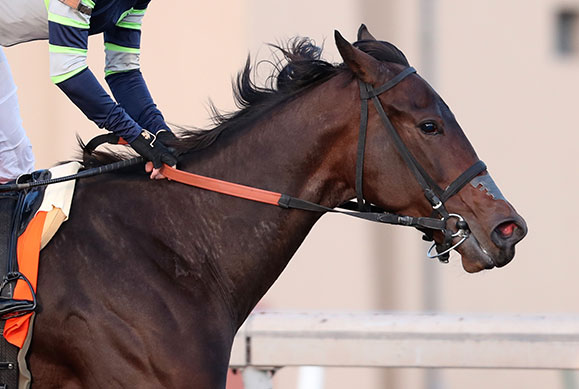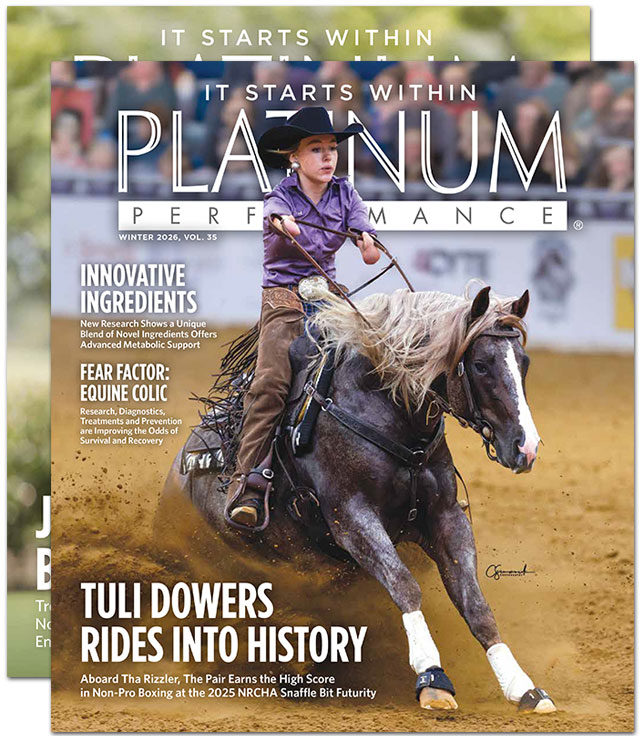Dr. Canaan Whitfield Has Made Significant Contributions to Veterinary Medicine Through His Clinical Work and Thought-Shifting Research Centered on the Equine Gut. Better Vet, He's Just Getting Started.
When we open a peer-reviewed journal and dig into the latest in veterinary medical research, we tend to have a stereotypical image in our minds of who these authors are. Established, more salt than pepper in their hair, eyeglasses on the bridge of their nose and an air of rock-solid scientific prowess in their presence. Dr. Canaan Whitfield, while certainly established and unwaveringly brilliant, doesn’t exactly come to mind as the visual. He’s young, but with every bit of street cred, per se, as his senior colleagues. Double boarded in equine surgery and sports medicine and rehabilitation, Dr. Whitfield is not only a talented hand with a scalpel but has a curious mind that has fueled his fervor for discovery. He’s out to change the shape of veterinary medicine but to do so by keeping a laser focus on the end game. It’s all for the betterment of the horse and the lives they lead.
Dr. Whitfield — joined by Drs. Michelle Coleman, Noah Cohen and their teams — published a paper in the Journal of Veterinary Internal Medicine in 2021 detailing work done to investigate the effects of phenylbutazone (“bute”) used alone or in combination with a nutritional therapeutic on gastric ulcers, intestinal permeability and fecal microbiome in horses. In short, Dr. Whitfield and team investigated the impact that widely used phenylbutazone has on the horse’s gut. This drug, along with so many other nonsteroidal anti-inflammatories (NSAIDs) is used daily in a vast number of horses, but the question is, could NSAIDs be causing harm to the horse and what can be done to potentially mitigate those effects?
Why the gut? Through his clinical work Dr. Whitfield has recognized the often underappreciated role that the equine gut has on the overall health, performance and longevity of the horse. The gut is essentially ground zero for so many systems in the equine body. Horses, like humans are in fact made up of interconnected systems working symbiotically to sustain life. Through his research, Dr. Whitfield confirmed that phenylbutazone does induce injury to the gastrointestinal system by way of gastric ulcers and leaky gut syndrome, a condition just now being explored in horses as it has been in humans. Not only does this damage occur, it occurs quickly and after as little as 4 days. Dr. Whitfield’s research model was thoughtfully simple — the study group received a nutritional therapeutic for 50 days, followed by 10 days of treatment with phenylbutazone. This group was compared with horses receiving phenylbutazone without the supplement or a placebo. Fecal samples were collected on days 0, 50, 54, and 59 for 16S rDNA sequencing to determine composition of the fecal microbiota, or bacterial makeup of each horse’s individual gut. Gastroscopy was performed on days 50 and 59 and blood was collected on days 50, 54, and 59 (during treatment) for gastric ulcer scoring and quantification of bacterial 16S rDNA in the blood, respectively. Dr. Whitfield found that phenylbutazone treatment increased circulating bacterial 16S rDNA, induced gastric ulceration and altered the fecal microbiota. Notably, these phenylbutazone-induced changes were avoided in horses receiving the nutritional supplement that includes omega-3 fatty acids, antioxidants, amino acids, vitamins, minerals, L-glutamine, prebiotics and probiotics.
Perhaps more than ever before, Dr. Whitfield’s work has shed light on the importance and fragility of the gut and, more specifically, the microbiota that fundamentally influence the horse’s health. What we had previously thought of as the simple use of phenylbutazone and other NSAIDs for soreness or pain is now understood as having far-reaching and potentially deleterious effects.

“Understanding that this microbiota is a central part of the whole horse can help us to understand that what we do does matter even if it’s not obvious to us initially.”
— Canaan Whitfield, DVM, PhD, DACVS, DACVSMR
“It's a very vast system,” says Dr. Whitfield of the equine gut. “Understanding that this microbiota is a central part of the whole horse can help us to understand that what we do does matter even if it’s not obvious to us initially. Many decisions that we make do influence the microbiota, whether it’s how we transport the horse or the drugs we choose to use, like anti-inflammatory drugs. These drugs do in fact damage the intestinal tract of the horse beyond just gastric ulcers, and they also result in a change of the microbiota. We’ve started to look at the effects of various nutritional therapeutics on preventing the damaging effects of anti-inflammatory drugs on the GI tract. That work, so far, is really exciting. We’ve shown that some of these compounds can prevent anti-inflammatory drug-induced injury to the equine GI tract. I hope that our research adds to this growing body of evidence that everything’s connected, and we need to think more about treating the whole horse rather than one body system or one disease at a time,” encourages Dr. Whitfield.
The thrill of discovery is exhilarating, and for Dr. Whitfield and his colleagues, that feeling is due to the undeniable impact their work will make on the horse. “The human animal bond between horses and people is truly unique and remarkable. The majesty and the emotion that they show is quite different than all the other animals I’ve worked with,” he says in true adoration of the horses he serves. “We don’t really know right now how exactly the microbiota influences the health of the horse. I think that’s what we need to do in the future is understand how each specific type of bacteria influences the health of the horse, so that we can then use that knowledge to result in the best outcome for that horse. I think if we can understand the ‘why’ behind these things, then we can finally have more effective therapeutics that result in better outcomes for all horses.” Thanks to the passion and drive of Dr. Canaan Whitfield and those like him, the horse will undoubtedly lead a healthier life in the future. Even with so much accomplishment behind him, Dr. Whitfield is hungry for more and plans to explore his theories through research in hopes of making an even greater contribution to veterinary medicine and to the horses he loves.
Can Advanced Nutrition Provide Protection?
In a recent study conducted to determine the ability of advanced nutrition to provide protection from phenylbutazone- induced GI injury including so-called leaky gut syndrome, it was concluded that supplementation with a comprehensive wellness formula containing probiotics, prebiotics and glutamine was able to reduce the occurrence of this syndrome.
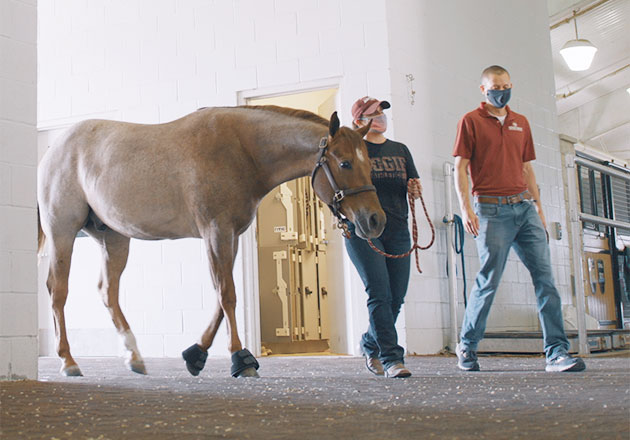
STUDY: The supplement was administered for 50 days, followed by 10 days of treatment (i.e., phenylbutazone or placebo). Fecal samples were collected on days 0, 50, 54, and 59 for 16S rDNA sequencing to determine composition of the fecal microbiota. Gastroscopy was performed on days 50 and 59 and blood was collected on days 50, 54, and 59 (during treatment) for gastric ulcer scoring and quantification of circulating 16S rDNA, respectively.
OUTCOME: Phenylbutazone (PBZ) treatment increased circulating bacterial 16S rDNA, induced gastric ulceration, and altered the fecal microbiota. Notably, all these changes were attenuated with nutritional supplementation.
Effects of phenylbutazone alone or in combination with a nutritional therapeutic on gastric ulcers, intestinal permeability, and fecal microbiota in horses. Canaan Whitfield-Cargile, DVM, PhD, DACVS, DACVSMR; Michelle Coleman, DVM, DACVIM (LAIM), PhD; Noah Cohen, VMD, MPH, PhD, DACVIM; Ana Chamoun-Emanuelli; Cris Navas Desolis; Taylor Tetrault; Ryan Sowinski; Amanda Bradberry; Matea Much, Texas A&M University, 2019. Journal of Veterinary Internal Medicine, March, 2021.

by Jessie Bengoa,
Platinum Performance®
You May Also Like
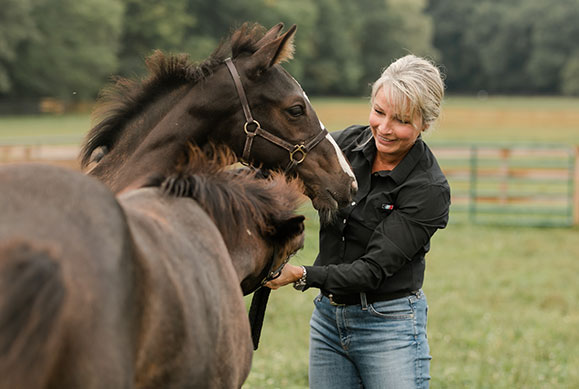
The Future of Veterinary Medicine
Dr. Cliff Honnas is Considered a Master of Kissing Spines. Dr. Lisa Fortier: A Revered Surgeon and Regenerative Medicine Guru. Dr. Shane Miller is an Admired Surgeon and Sports Medicine Practitioner
Read More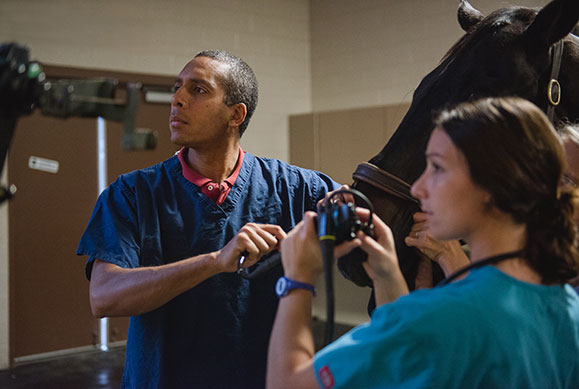
Understanding Ulcers
Potential Causes, Treatments and Preventatives
Read More about Ulcers in Horses